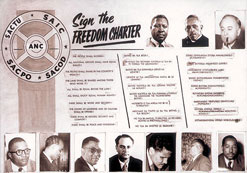
South Africa’s Freedom Charter up for Auction
by Janine Erasmus A copy of South Africa’s Freedom Charter will be auctioned in London later in March, and is expected to fetch anything up to £30 000 (R333 613). The Freedom Charter is an important part of South Africa’s past and was the forerunner of the country’s Constitution, universally hailed as one of the […]

by Janine Erasmus
A copy of South Africa’s Freedom Charter will be auctioned in London later in March, and is expected to fetch anything up to £30 000 (R333 613). The Freedom Charter is an important part of South Africa’s past and was the forerunner of the country’s Constitution, universally hailed as one of the most progressive in the world.

The historical document was adopted at the Congress of the People, which was convened in Kliptown, Soweto, in June 1955. This meeting was attended by about 3 000 people, of which 320 were Indian, 230 coloured and 112 white. One of the delegates was Nelson Mandela, although his movements and activities had been restricted by the government of the time.
Auction house Bonhams said it expected the Freedom Charter to bring in between £20 000 (R222 407) and £30 000 when it goes under the hammer on 24 March.
However, the document will not leave South Africa because it will be sold without an export licence. The identity of the seller has been revealed as former president of the South African Congress of Trade Unions, Leon Levy.
According to Bonhams spokesperson Julian Roup, the document is a copy but has been signed by the signatories to the original Charter. These include then African National Congress (ANC) president Albert Luthuli, Pieter Beyleveld of the South African Congress of Democrats, James “Jimmy” La Guma of the South African Coloured Peoples’ Congress, Gagathura Mohambry “Monty” Naicker of the Natal Indian Congress, and Levy himself.
Other South African works on offer on the night include a number of pieces by some of the country’s most famous artists, including William Kentridge, Cecil Skotnes, Gerard Sekoto, Maggie Laubser and Irma Steyn.
Charting the way to freedom
The Freedom Charter arose out of the Congress of the People campaign, instituted by the ANC in the mid-1950s to bring the various liberation movements in the country together with a common list of demands, in accord with the 1948 UN Universal Declaration on Human Rights.
The ANC sent over 50 000 so-called “Freedom Volunteers” out to the townships to publicise the forthcoming national freedom convention, and to collect suggestions and demands for the Freedom Charter which had been mooted at the ANC’s Cape congress in 1953.
It was the distinguished academic Professor ZK Matthews who came up with the idea, saying, “I wonder whether the time has not come for the ANC to consider the question of convening a national convention, a congress of the people, representing all the people of this country irrespective of race or colour, to draw up a Freedom Charter for the democratic South Africa of the future.”
Once all the demands were in the National Action Council of the Charter set to work sorting and categorising them. The backbone of the document slowly emerged from the jumble of information, and the council presented it to the ANC the day before the opening of the Congress of the People.
Its famous opening words, “We, the people of South Africa, declare for all our country and the world to know that South Africa belongs to all who live in it, black and white,” are today enshrined in the Constitution.
The Congress alliance consisted of the ANC, the South African Indian Congress, the Coloured People’s Congress and the South African Congress of Democrats. These organisations together presented the Freedom Charter as the statement of their principles.
Police interrupted the two-day congress on the second day, but by then all those present had already heard the tenets of the Charter and were fired up for action. To escape arrest, Nelson Mandela had to disguise himself as a milkman, a situation described in his autobiography Long Walk to Freedom.
The government denounced the Charter as a communist document, and because communism was banned at the time, they proceeded to arrest over 150 activists, including Mandela. This led to the notorious Treason Trial of 1956, which dragged on until 1961 when all 156 accused were found not guilty.
Their arrest and incarceration could not stop the surreptitious circulation of the Charter among young and old freedom fighters, and it kept the hopes of the people alive.